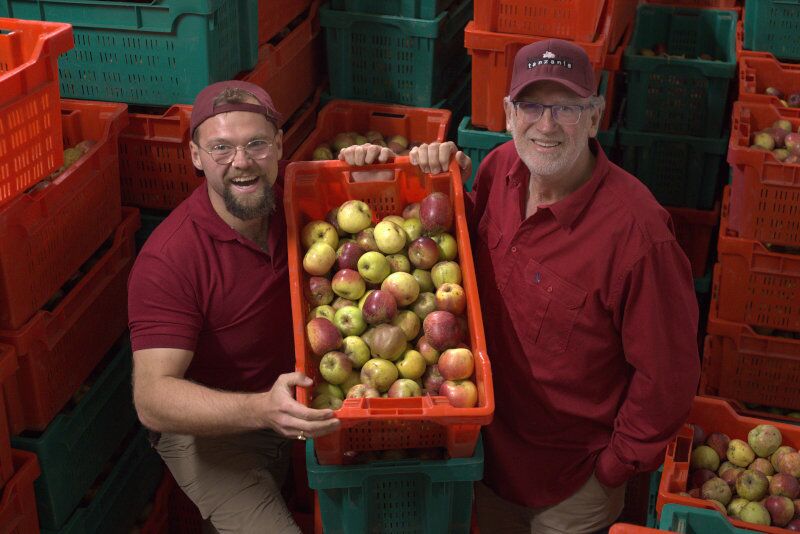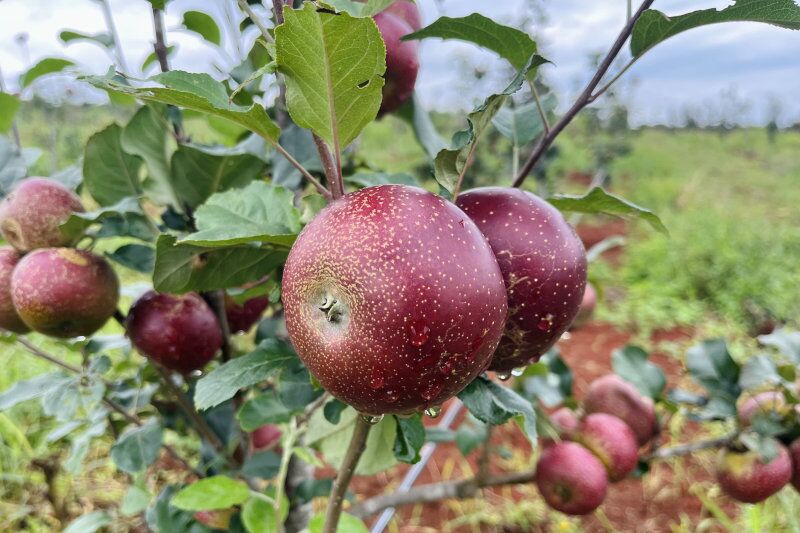Africa
Why this German invested in Tanzania’s first commercial apple farm

David Runge (left) and his partner at Tamu Tamu Tanzania, Peter Schuurs
Interview with David Runge
PARTNER, TAMU TAMU TANZANIA
Lives in: Tanzania
While fruits like pineapples, bananas, and mangoes thrive in Africa’s equatorial region, apples typically do not, as they favour cooler climates. However, German-born entrepreneur David Runge spotted an opportunity in apple farming in East Africa. He invested in Tamu Tamu Tanzania, which claims to be the region’s first commercial apple farm and apple tree nursery, located 540km west of Dar es Salaam. The company has conducted extensive research and development to identify and cultivate apple varieties that can thrive in the equatorial climate.
Jaco Maritz spoke with Runge about his commercial endeavours across Africa, his entry into the apple farming industry, and his ambitions to expand the production of apple juice, cider, and other apple-based products in Tanzania and beyond.
Topics discussed during the interview include:
- Runge’s early business ventures across Africa
- His experience working for a Nigerian catfish company
- The startup ideas that failed to take off in Tanzania
- The opportunity he identified in Tanzania’s apple farming industry
- How the partners financed their apple farming business
- Expanding into the production and sale of apple juice and cider
- Why agriculture is not for the faint-hearted
Watch the full interview below:
Interview summary
German-born David Runge, 31, has for long had an interest in doing business in Africa. “I always enjoyed the vibrant business culture in Africa,” he says. “In Europe, everything already feels like it has been invented. Someone already thought about it. Here, I like the growth, I like the change, I like the fast-paced environment.”
Runge’s early exposure to the continent came through internships in Uganda and South Sudan. After completing his studies in agribusiness at a university in Europe, he secured a senior role at a catfish company in Nigeria.
“I remember how I arrived in Nigeria and the group managing director told me within the first week: ‘David, if you’re able to manage operations in Nigeria; if you’re able to lead a company here in Nigeria, you can do it everywhere.’ By that time, I didn’t know what he meant. Some months later, I figured out what he actually meant by that. And yeah, it was, I would call it a real life MBA,” he reflects.
After about two and a half years at the Nigerian company, Runge was headhunted to work in Myanmar and later in Dubai. However, he grew dissatisfied in his role and decided to quit, aiming to start his own business.
After travelling through East Africa for three months, he chose Tanzania as the place to start his next chapter.
E-commerce and seaweed: early business ideas
In Tanzania, Runge initially explored several business opportunities. His first attempt was an e-commerce venture, but it didn’t work out due to regulatory circumstances. Next, he ventured into the seaweed industry, a significant sector in the country, but soon realised it would require too much capital to scale. Shifting focus, he tried supplying an ERP system for seaweed farmers, but this endeavour also didn’t succeed.
Venturing into apple farming
The apple farm that Runge invested in was originally established in 2016 by two young entrepreneurs who conducted initial research and development (R&D) to identify apple varieties suited to equatorial conditions. Runge’s current business partner, Peter Schuurs, a family friend, was the first to spot the opportunity to acquire the farm and brought it to Runge’s attention.
Intrigued, Runge conducted his own research and uncovered strong demand for apples in the East African market. “I did my own due diligence. And [whether] if it is in Kenya, Uganda or Tanzania, at every bus stand, in traffic, people would sell apples. At every supermarket you would find apples. And they are sold here for half a dollar a piece. That’s a lot money,” he explains.

Tamu Tamu Tanzania is producing apple varieties suitable for the equatorial region.
Despite the high demand, most apples in the region are imported, and Runge saw an opportunity to supply the market with locally grown produce.
He and Schuurs decided to partner up: Schuurs would oversee the farming side, while Runge would handle the commercial aspects. They financed the farm’s purchase from their personal savings, accumulated through their previous corporate roles.
Together, they began the process of rehabilitating the farm and putting new systems in place. Building on the initial work of the previous owners, they continued R&D efforts to produce apple varieties best suited to the region.
Tapping into demand for apple trees
Selling apple trees has become one of the company’s key revenue streams. The business has supplied trees to buyers across Africa and even as far as South America. A major part of their strategy involves selling apple trees to small-scale Tanzanian farmers, with the goal of later buying back the apples for their processing operations.
Runge explains that farmers typically start by purchasing a small number of trees, anywhere from 50 to 1,000, to see how well they perform. When satisfied with the results, they return to buy more. As a result, apple tree sales are likely to increase significantly in the coming years.
From juice to cider: Producing value-added apple products
In addition to supplying apple trees, the company has expanded into producing apple-related products, such as juice, cider, and dried apples.
“We’re making a cold pressed apple juice, which in Tanzania or Kenya or in Uganda no one has had before. And we are cost competitive with the imported juices. But the quality is – I don’t want to blow our own trumpet horn too much – but it is outstanding,” Runge says. He also notes that Tanzania’s established tourism industry presents a significant market for juice sales.
The company has also begun producing cider on a small scale, though Runge believes this will become a major focus for the business. “I’m looking forward to sell cider big time … The cider will be a main part of this company because it is such a great product. There’s such high demand. There’s nothing in comparison here in East Africa.”
Fresh apple dynamics
When it comes to fresh apple sales, Runge explains that selling at scale requires specialised equipment for sorting, washing, and packaging – equipment the company currently lacks, along with the operational capacity to manage such an endeavour. However, he notes that expanding into large-scale fresh apple sales is something they plan to explore in the future.
One advantage of selling fresh apples is the quick turnaround time for receiving cash, Runge says. In contrast, the cycle for juice or cider, from purchasing apples to receiving payment, takes much longer – several months more.
The tough realities of agriculture
Despite Tamu Tamu’s progress, Runge underscores that agriculture comes with its challenges. “Agriculture is not for the faint-hearted – capital intensive, long payback period, low margins, politically and weather influenced, and so on and so on … You have to hustle. You have to make it work. You have to bring some cash along to actually finance it till you make it work.”
Tamu Tamu Tanzania partner David Runge’s contact information
Contact details are only visible to our Monthly/Annual subscribers. Subscribe here.
Related articles






